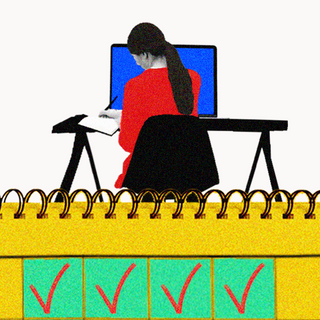
It’s Okay: To Not Always Be There for Friends
Just like love, empathy is a limited resource.

In It’s Okay, we defend our most embarrassing, unpopular opinions.
Sometimes, I feel like the worst person in the world.
A person who wants to care and support the people they love, but… just can’t. My heart breaks for the friend who’s nursing their heartbreak. My anxiety sits uncomfortably on my chest as I watch another friend grow weaker under its weight. My exhaustion finds a companion in my colleague’s burnout. I grieve for them, but sometimes, in cursory moments when I have little to offer, I can’t grieve with them.
I feel like the worst person in the world because sometimes, I fail to live up to the expectation I would have of my friends too. It’s selfish, even hypocritical, for action to not match intent. No one is too busy not to respond to a text, or too emotionally drained to lend a sympathetic ear — especially for a loved one.
Except, they are. Friendship demands presence, selflessness, and empathy above all else. But empathy, not unlike love, is a finite resource. It feels almost reductive to liken empathy to a battery pack that needs to be put on charge, as if it’s a commodity that loses its value or worth over time. But that may very well be the case, because the people holding on to this empathy are deeply vulnerable and imperfect. Emotional exhaustion can’t be quantified, but evidence shows patterns of emotional scarcity: almost 36% of people surveyed reported a sense of cognitive weariness, 32% reported emotional exhaustion, and almost 44% reported physical fatigue. Everything from longer work hours to increased demands at home is making it harder to reasonably engage with ourselves, let alone others we care about.
It’s almost as if stress, burnout, fatigue, and emotional chaos are walls closing in on us. And arguably, individual stressors shape the way we respond to other people too. Research this year found stress to be a potent emotion, in that it made even empathetic people less kind, less altruistic towards others’ needs. “Stress spills into our personal lives in many ways, affecting the quality of our close relationships… When people are stressed, they become more withdrawn and distracted, and less affectionate,” wrote Amie Gordon, a social psychologist at the University of Michigan. Biologically this plays out in the brain’s neural networks, where cortisol, the “stress hormone,” alters brain activity in regions linked to social decision-making.
To put it simply: even if one wants to be there for someone else, sometimes, they just can’t. And no one puts it better than Rachel N. Remen, who beautifully wrote: “The expectation that we can be immersed in suffering and loss daily and not be touched by it is as unrealistic as expecting to be able to walk through water without getting wet.”
Related on The Swaddle:
Why We Are Able to Empathize With Some, Never All
So much of this expectation comes from a flawed understanding of friendship and platonic affection. Popular culture has given us a script for how romance plays out: first, we were told love has no boundaries, then we taught ourselves to erect some and care for ourselves before others. The knowledge of romantic relationships is still evolving but we’re coming to a consensus that an over–reliance on your romantic partner isn’t the best idea.
So far so good. But where is the script for love and intimacy in friendships? No, Sex and the City or Friends aren’t helpful examples, especially today. No one has the kind of time and money and energy to invest in others — even if they are your closest friends. T*, 26, was in a quandary when she had to decide between two weddings. Her friends expected “if I love them, I’ll show up… [But] If I do that, I will get fired and be broke…. Bunny and Naina drop everything to attend Aditi’s wedding for days on end in Yeh Jawaani Hai Deewani. The women in Four More Shots Please! drop everything and go to Istanbul — and then, also make it to a destination wedding… Like, do you guys not have jobs?”
We know when we have the bandwidth to engage, and when we don’t. It’s okay to say no in friendships, to tell the people you love that you need to tap out. Prioritize yourself, your work, even someone else — if that’s what it takes in this moment in time to keep yourself afloat.
Friendships are relationships too that deserve care and kindness and deliberate attention. We nurture them because they give us a “first glimpse of redemptive love and caring community,” as bell hooks put it. So if there were a script, and we may as well craft one, it would involve some form of boundary-setting. I love you, but right now, I need some time away. Arguably, there is a right time to have this conversation, before you escape and evade and make the other person feel guilty for badgering you. The conversation is an act of self-preservation still, for it is the only thing that can sustain a friendship.
Better is a relative term; being a better friend also involves self-care in relationships, and that means checking out when you think you don’t have the capacity to engage.
Maybe, and hopefully, we unlearn and relearn what it means to be there for people in time. It’s not always long ranting messages, consolations given by way of “you’re right!!!” or “HOW DARE HE???” or “I’m so sorry you’re going through this.” Sometimes, people can be there for each other even in silence, and even in absent company. It’s okay to not be there, because at least you’re being there for yourself.
Saumya Kalia is an Associate Editor at The Swaddle. Her journalism and writing explore issues of social justice, digital sub-cultures, media ecosystem, literature, and memory as they cut across socio-cultural periods. You can reach her at @Saumya_Kalia.
Related


Many Firms That Tried Out 4‑Day Work Weeks Are Planning to Make It Permanent
